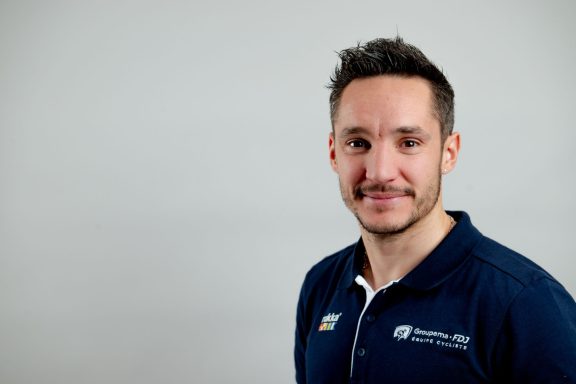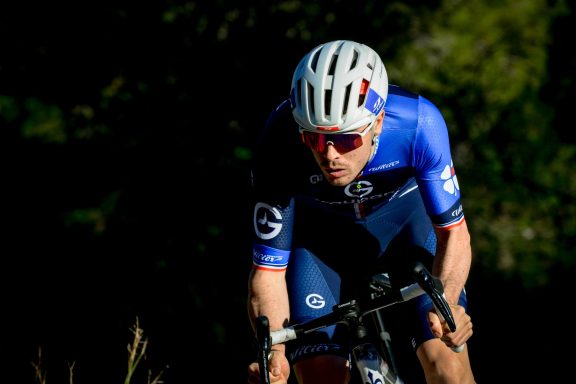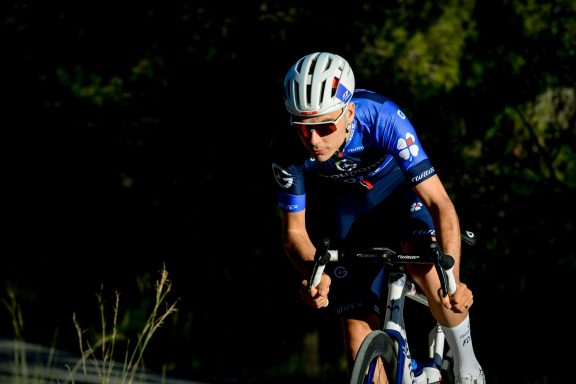Over the winter, the Groupama-FDJ cycling team has set up its nutrition department within the medical one, on the supervision of Doctor Jacky Maillot. It became more established with nutritionist Lucas Papillon and chef Mickaël Bougault joining the organization, proving the team’s will to further improve its knowledge in the rider’s nutrition area. In order to present this department and its various fields of action, we gave the floor to the three persons previously mentioned.
The nutrition department, the logical next step
“Until then, the nutrition department did not have such a clear identity, but we have been developing this area within the team for a long time,” explains Jacky Maillot. “Previously, we were mainly interested in the energy-giving role of nutrition. With the scientific data now available, we note that nutrition has a much more important and much broader role than this one. It also has a major influence on immunity, which can be challenged by prolonged endurance sports such as cycling. It also has an impact on the intestinal flora and on the way we deal with the oxidative stress. We have carried out work with the University of Besançon and it has also been proven that nutrition can cause certain diseases such as asthma to the cyclist. We have also been working for a very long time with micro-nutritionist Denis Riché. Thanks to questionnaires, blood tests and analyses, we can control how our athletes assimilate the food. Based on this, we adjust the nutrition to their needs, which are naturally very different from those of the guy next door, whether in terms of micronutrients or macronutrients. We wanted to develop tools to go further and to supervise each one as precisely as possible. This is why we have expanded our department”.
“It was also a request from a lot of riders,” said Lucas Papillon. “They wanted even more support and more tools to eat better and better maximise this area of performance. The nutrition field is constantly on the rise. The idea was therefore to dig deeper into macro-nutrition, which was an aspect of performance that could be slightly less developed than others, such as equipment, within the team”. “With the creation of this department, the work is more complete and falls within the approach of monitoring and supervising,” says Mickaël Bougault. “From now on, my work starts well before the races. For instance, I am currently preparing menus for the Ardennes Classics and requesting the necessary products to the hotels. It would have been difficult to do this in the past. We are now in a position to have an even more specialized process”.
Constant and personalized support
“We thought it would be appropriate to take up the basics of home nutrition for the riders,” explains Lucas. “As good as the support on the races can be, if they do not have good habits and the right ways of doing things at home, we can lose them quickly and eventually find deficiencies. I made a point of talking to each of the riders to acquaint myself with their nutrition because it is also very different depending on the country and culture. Besides, there is not a perfect nutrition that should be imposed on everyone. The purpose rather is to optimize the one that already exists. Once the assessment phase was completed and the areas for improvement were detected, I was able to send them the adapted nutritional plans. I could recommend the right amounts, the right foods depending on the day or the training, and give them tips such as the best water to choose. This was an important process to go through, because although we have micro-nutritional monitoring, it is always better to be safe than sorry”.
“To support our young riders, but also the more experienced ones, we also create recipe material, like files or videos,” adds Jacky. “For the youngsters within the Conti, we are also setting up courses. A pro rider is home more than 200 days a year, so nutrition needs to be optimal. We should not only focus on the race’s one. This is all the more important for young riders who are just leaving the family home and who may not necessarily know how to cook. We have to start from the basics, and we help them through recipes on our platform for all meals, including snacks. These moments need to be cherished and we try to be really educative from this point of view. It is easier to teach good habits than to lose bad ones, and we all know that cycling has its traditions. We are therefore trying to make the young ones get the message right so that they learn to do their job properly”. “Very often after dinner in the races, the riders come to ask me for the recipe in order to make it at home”, says Mickaël. “In that case, I film it and then send it to them. When they need information, they know they can text me. When they try a dish and the outcome is not what they hoped for, they try to find out where they made the mistake. For them, eating is a real pleasure”.
Quality and pleasure on the plate
“Nutrition and food should be a pleasure, not a constraint”, underlines Jacky Maillot. “We always try to find the right balance between pleasure and needs. In order to eat well, the plate must also be pleasant, and make you want to taste it. We know this is important. We also try to maximise healthy and qualitative intakes. For example, we have launched with Groupama the #MusetteGroupama operation, which allows member farmers to become the team’s fruit and vegetable suppliers for a race. Concretely, in Paris-Nice, we had a delivery from them, which we were able to use all week. This enables us to work with local farmers and to get as much organic food as possible. Today, we are fortunate to have among us a very skilled chef with Mickaël, who has references in starred restaurants and who fully makes the most of these quality foods. He knows how to compose a beautiful dish with good nutrients. When you see the dishes he makes, it’s like gastronomy! He also works together with Vanessa Cossard who has a large experience as a sports assistant. She knows the riders’ needs and habits, and has also completed a professional training to become a cook.“
“The very first thing is to feed the riders,” says Mickaël. “It is then necessary to bait them a bit with the visual side, the presentation. This is also our job. We cook for athletes, but we are still cooks in a first place! In the end, we combine the personal pleasure of our job with the needs of the rider. We obviously take their tastes into account, and we also try to avoid monotony in the dishes we make. Last year, on each of the three Grand Tours, we never offered a similar starter, main course and dessert over the three weeks. The riders are also quite gourmet and they like being surprised. For them, sitting at the table at night is also the pleasure of the day – with massage perhaps -. There are also a lot of young men who do not have very seasoned palates, so they can sometimes taste something they had never tried before, and possibly reproduce it at home. Thanks to the #MusetteGroupama operation and the Groupama members, we can also cook local, and therefore seasonal vegetables, which make it possible to provide diversified menus throughout the year. The willingness to work with quality organic products is now part of the team’s DNA. Riders are also very interested in this and often ask questions when they get the finished dish. We get a lot of thanks at the end of the races. For them, it has also become a bit of a luxury”.
Cooperating on the recipes
“Lucas usually sends us basic outlines pointing out what we need to take into account for breakfast, for snacks as well as for the various menus,” explains Mickaël. “Then, we respect it according to the products available on the race”. “We complement each other very well in this work,” adds Jacky. “We give Mickaël specifications and then he uses his imagination to create perfectly adapted dishes”. “We are lucky to have very talented cooks who fully understand the needs of the riders,” says Lucas. “We don’t want to restrain them, the idea rather is to refine a few recipes to optimize them from a nutritional point of view. They simply have the list of preferential foods to use according to the type of day, and then they compose their menu according to the availability, their savoir-faire and their desire. They will always have something from the list to hand. This is just the start of this collaboration. We still have a few weeks to further improve it, but the goal is absolutely not to impose a theoretical vision. We want to give free rein to everyone’s knowledge and skills”.
“For example,” continues Lucas, “Jacky wanted the snacks to be modified because they did not necessarily meet all of the needs. From this observation, Mickael suggested recipes that made sense to him, and I then slightly corrected them with details: change of oil, change of starch. I also tell him the right quantities so that each rider gets the right inputs. David Gaudu and Stefan Küng do not necessarily have the same needs. It is essential to individualize. That being said, the perfect nutrition is different from the realistic nutrition on-site, where everyone must be able to do his job properly. Therefore, we split the team into weight groups. The starch adjustments are made according to that, so that we have four threads and not thirty”. “We are also aware of any allergy,” adds Mickaël. “It is not a problem at all, especially when you know it way before. Also, we are spoiled enough in terms of products to replace one food with another. We’re constantly adjusting”.
Searching & developing better products
“Together with our dietetic partner Apurna, we have started a collaboration to create a range of products perfectly suited to our needs,” explains Jacky. “We have very constructive talks with them, but it is not an easy process. You can’t put whatever you want in an energy drink. We know Apurna has a lot of experience as for the recovery products. With them, we mostly develop products adapted to all the physiological issues of high-level sport. It’s a win-win cooperation. They get feedback from high-level sports and we’re getting drinks that are completely suited to what we’re looking for. They are very interested in our experience, because our observations from the inside and our needs are sometimes very different from what they can imagine”.
“Regarding food supplements, we work with PILEJE. I have personally been working with them for ten years. Thanks to them, we really are ethically safe regarding these supplements, which contain many elements, including some that can be contaminated by doping products. With PILEJE, we have an excellent guarantee of protection against such contaminations. We also know that a rider will preferentially absorb certain oxidants compared to a normal person. They are developing very interesting products in this regard, and the talks are also very constructive. One should not forget that the pro riders population is a very special one. However, the main goal still is to have healthy riders, not only for them to perform well, but also because they are more often ex-riders than actual riders. We want them to be in good health when they retire.”
Warning about the dangers
“In order to feel good, nutrition must always remain a pleasure,” says Jacky. “If we do too austere things because we want to follow some rules that are too strict, we fall into eating disorder’s drifts that can lead to burnout. I am not on board with the cult of thinness. In my opinion, a successful rider is a healthy runner. This is the team policy. I don’t want the rider to be required to be that weight in that event. He is responsible. We give him all the tools to be ready on D-Day, but we should not oblige him. Pedagogy is more important. We obviously control weight and fat mass, but we are not obsessed with it. Some teams do have this process, but that’s not how we see it. We are looking at the longer term. If there are too many restrictions, we cause issues at various levels and fall into the wrong side”.
“We share the same point of view with Jacky”, concludes Lucas. “I always introduce myself to the riders as someone who wants to maximise their nutrition, not change it. The main part of nutritional monitoring is absolutely not weight. I prefer a rider to be one or two kilos heavier and be in good health, recover well, rather than two kilos lighter and suffer from failures or deficiencies. Weight is certainly a factor in performance, but it is not the major one at all, as many may think. It’s true that the trend in cycling has always been to be as honed as possible. We especially try to warn the young riders of the “Conti” in that regard. If you eat well, if you do things right, the weight never is an issue. The purpose is not to weigh less but to have a good physiological performance. We need to find the right balance. Eating should be a please. Pro cycling already requires a lot of sacrifice; we should not add another obligation. Nutrition should be there to support them, direct them and allow them to optimize their performance a bit, without worrying too much about it. For instance, I don’t necessarily encourage riders to weigh their food. Nutrition-wise, doing more doesn’t necessarily mean doing better. We need to do prevention in order to avoid excesses, which can often lead to losing more than earning”.



No comment